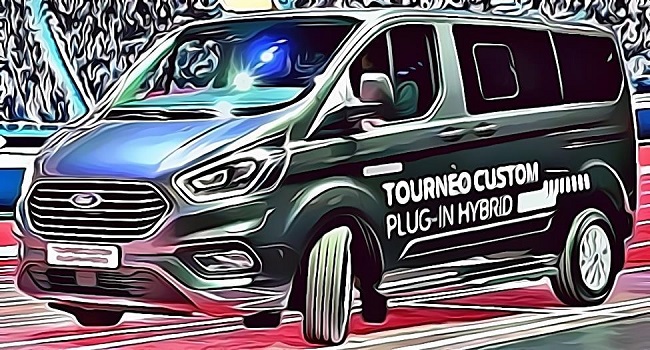Ford Motor Company in Europe examines new innovative geofencing and blockchain technologies incorporated into the company’s new fleet of plug-in hybrid electric vehicles (PHEVs).
Geofencing allows Ford vehicles to document, record and even automatically switch the emission modes according to regional weather or environmental conditions as well as emission-controlled zones, while blockchain technology enables secure and error free recording of vehicle emission data.
Ford has introduced two versions of PHEVs called Transit Custom Plug-In Hybrid and Tourneo Custom Plug-In Hybrid, which are ideal for driving in urban areas. For intercity journeys, Ford has introduced the above variants with a 1.0-liter EcoBoost petrol engine.
Ford has already started testing these vehicles to analyze how geofencing and blockchain can have real-word applications to contribute to clean-aired environment and commercial vehicle owners’ and operators’ benefits. The vehicles are already being tested on the streets of various cities in Europe.
The automotive giant is planning to put nine Ford Transit Custom Plug-In Hybrid vans and one Tourneo Custom Plug-In Hybrid people-mover in the city of Cologne, which has recently introduced new low-emission zones in the city.
Similar to other cities in Europe, Cologne has introduced several low-emissions zones to address air quality challenges. These low-emission zones can prove to be troublesome for both the cities implementing and administration and the drivers, who might face the issues when the cars switch to low-emission mode. Ford is planning to take over these key challenges in the city of Cologne with its PHEV tech pilot where different emission mode change might take place automatically once the vehicle enters a low-emission region.
“Ford is committed to delivering new, more environmentally sustainable vehicles that can help address the mobility challenges our cities face,” said Mark Harvey, director, Commercial Vehicle Mobility, Ford of Europe. “The plug-in hybrid electric vehicle trials with our partners in the City of Cologne build upon our ongoing electrification programs elsewhere in Europe, and bring us all closer to meeting our combined urban air quality goals.”
Other vehicles are on test in the cities of London, UK, and Valencia, Spain. The testing and detailed analysis of these vehicles will help the company to determine the applications of geofencing and blockchain technology to accurately track emission data and record the low-emission miles driven by vehicles.
“The blockchain technology we are testing here in Cologne enables secure, tamper-proof tracking and logging of vehicle emissions records, which makes it ideal for the PHEV pilot,” said Gunnar Herrmann, chairman of the management board, Ford-Werke GmbH.
This new pilot may open the doors of opportunity for Ford to become an official partner of SmartCity Cologne which was initiated by the City of Cologne and regional energy supplier RheinEnergie AG.






